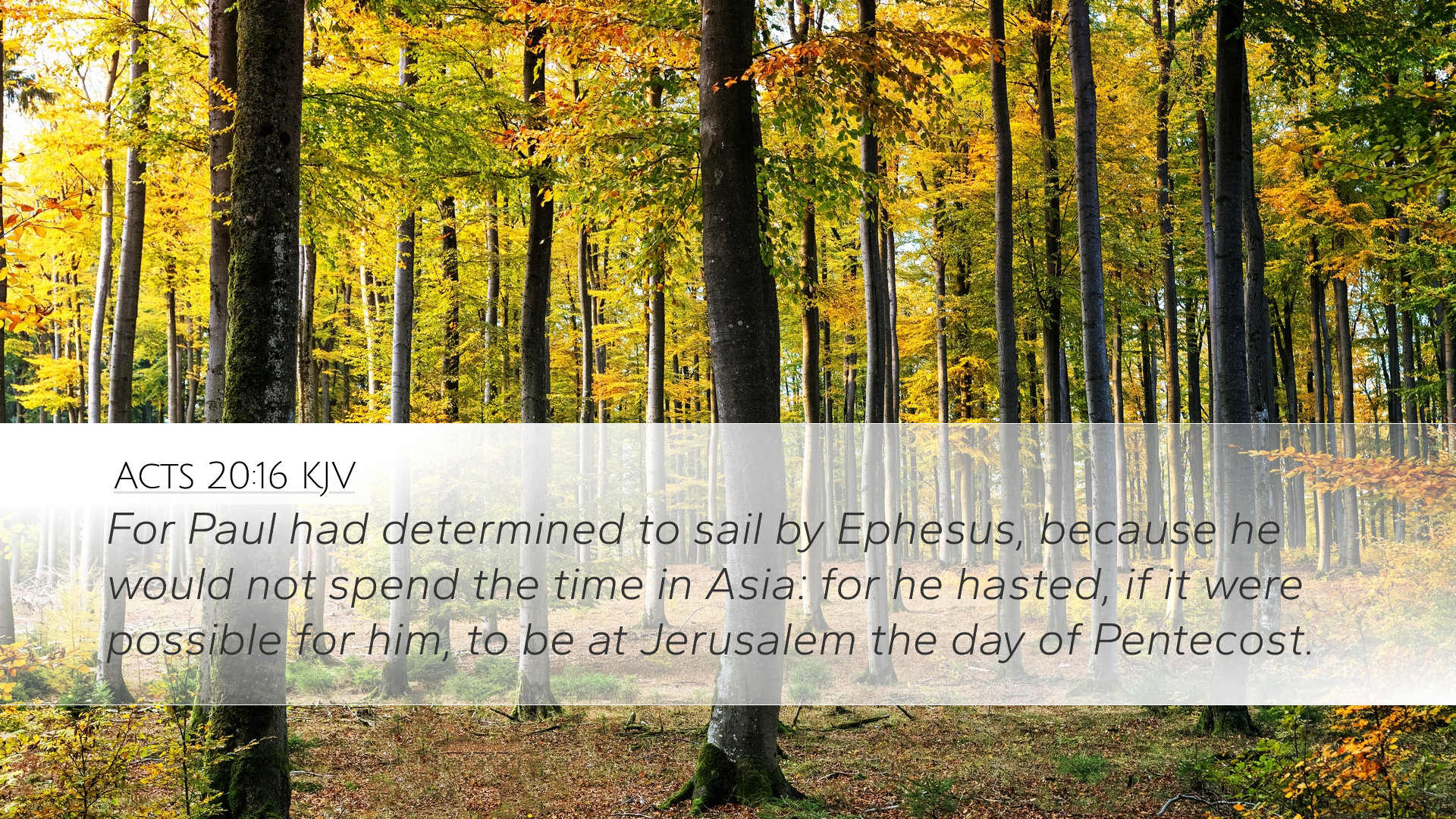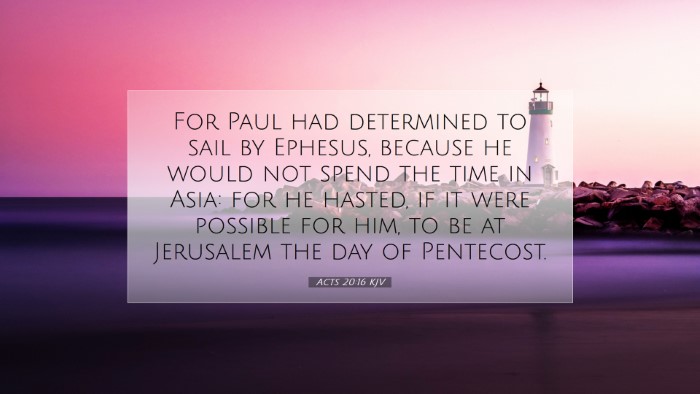Commentary on Acts 20:16
Verse Context: In Acts 20:16, we find the Apostle Paul making a significant journey as he travels to Jerusalem. This verse states: "For Paul had determined to sail by Ephesus, because he would not spend the time in Asia: for he hasted, if it were possible for him, to be at Jerusalem the day of Pentecost." This decision and the surrounding context provide profound insights into Paul's priorities and motivations as a leader in the early church.
Overview and Significance
Paul’s determination to reach Jerusalem highlights his unwavering commitment to his mission. The mention of Pentecost suggests a deep spiritual significance tied to this journey. The Feast of Pentecost, a key event in the Jewish calendar, represented the celebration of the first fruits of the harvest and marked the occasion when the Holy Spirit descended upon the apostles.
Commentary Insights
-
Matthew Henry's Commentary
Matthew Henry emphasizes Paul's sense of urgency and mission. He notes the significance of Ephesus, a major center of early Christianity, and how Paul, despite its importance, chose not to stop there. His focus was on reaching Jerusalem in time for the feast, illustrating a balance between pastoral care and personal spiritual devotion. Henry argues that Paul’s decision illustrates the commitment of leaders to their God-given tasks, drawing attention to the need for priorities in ministry.
-
Albert Barnes' Notes
Albert Barnes outlines that Paul’s choice to sail by Ephesus serves as a calculated decision rooted in his desire to fulfill his calling. He reflects that Paul had many responsibilities, which means that sometimes a leader must make difficult choices regarding where to invest their time. Barnes highlights that this demonstrates the nature of Christian ministry where one must often weigh their time against the needs of others.
-
Adam Clarke's Commentary
Adam Clarke comments on Paul’s haste, suggesting that his intention to be in Jerusalem by Pentecost reveals his respect for the Jewish customs and feasts, as well as his desire to engage fellow believers. Clarke provides cultural insight into the significance of the day, noting that it was a time of great festivity and spiritual significance for the Jewish people. He expands on this point by discussing how Paul saw value in connecting with the Jewish Christian community during this pivotal time.
Theological Implications
The theological significance of this passage extends into several areas that warrant careful consideration:
-
Divine Providence:
This text illustrates the concept of divine guidance. Paul's journey was not simply a matter of personal ambition; it was directed by a desire to fulfill God’s purpose. This reveals God's providential hand in the missionary efforts of the church.
-
Missionary Urgency:
Paul’s haste to reach Jerusalem encapsulates a core aspect of the Christian mission: the urgency of spreading the gospel. The believer's life should reflect an ongoing commitment to service, urging the present necessity of responding to God’s call upon their lives.
-
Community and Tradition:
Paul’s respect for Pentecost signifies his acknowledgment of the importance of community traditions. Despite the awesome work of the Spirit that had begun in the church, the continuance of Jewish festivals shows a bridge to heritage while advancing the new covenant.
Application for Today’s Believers
The implications of Acts 20:16 are manifold for contemporary believers:
-
Leadership and Priorities:
Church leaders are reminded to set clear priorities, balancing pastoral care with the urgency of their calling. Decisions often involve difficult choices that can reflect a deeper commitment to God’s purpose.
-
Mission-Driven Life:
All believers should reflect on what it means to live with urgency for the Kingdom. Acts of service, evangelism, and community building are calling points for every Christian, and they should strive to align their actions with God’s timing and plan.
-
Respect for Heritage:
Respect for traditions and communal practices can be valuable, even as believers embrace the newness of faith in Christ. Engaging with history can deepen our understanding of God's ongoing work among His people.
Conclusion
Acts 20:16 serves as a reminder of Paul’s apostolic zeal and the necessity of divine direction in our lives. As modern-day believers, we must take lessons from Paul’s journey, acknowledging the balance between our responsibilities, the urgency of the call to spread the gospel, and the rich tradition of the faith we inherit. Reflecting on these insights allows us to deepen our understanding of God's work through history and encourages us to live in alignment with His purpose today.


